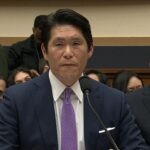
Published September 20, 2023
The irony was not lost on many—Roe v. Wade, the Supreme Court ruling legalizing abortion that motivated many religious and social conservatives to get into politics, was overturned in large part because of a man who was decidedly an outsider to those movements. And that marriage of convenience is now putting pro-lifers’ ultimate aims at risk.
In 2016, Donald Trump overcame early missteps to make a strategic alliance with socially conservative groups, promising his judicial nominees “will be pro-life” and talking in vivid terms about late-term abortion in his final general election debate. Those stances cemented an unlikely, if fruitful, partnership between the Trump administration and activists dedicated to ending abortion—some of whom called him “the most pro-life president ever.”
Much of that praise was vindicated when the Supreme Court overruled Roe last summer in Dobbs v. Jackson Women’s Health Organization, which gave states the ability to set their own laws restricting abortion. But the politics of abortion have since shifted. And Trump—who has always demonstrated an above-average ability to sense which way the political winds are blowing—has adjusted his rhetoric in turn.
Earlier this year, Trump blamed “the abortion issue” for costing the GOP congressional seats in the 2022 midterms. In April, he rubbed anti-abortion advocates the wrong way by equivocating on the idea of a 15-week federal abortion ban. And this weekend, on NBC‘s Meet the Press, he went a step further.
In a second Trump administration, the former president said, a national compromise on abortion would be forthcoming. “We’re going to agree to a number of weeks or months or however you want to define it…. It could be state or it could be federal. I don’t, frankly, care.” He explicitly ruled out a 15-week federal abortion ban (which would only touch 4 percent of all abortions performed nationwide) and called Florida’s six-week abortion ban “a terrible thing and a terrible mistake.”
With his tendency to attack first and ask questions later, parsing the former president’s words too carefully is often a mistake. After all, Trump’s political flexibility and lack of interest in the ideological and philosophical commitments that drive many conservatives have been assets for him. As Matthew Yglesias, then of Vox, wrote at the time, Trump would likely have lost in 2016 if voters hadn’t seen him as being more ideologically moderate than his opponent, Hilary Clinton.
Similarly, his sandbagging of Florida’s aggressive legislation on abortion is likely explained by his political rivalry with Gov. Ron DeSantis, who is currently fading in the GOP primary polling.
But a common thread in his abortion-related comments is that Trump sees himself as having delivered on his end of the bargain—overturning Roe—but holds no deeper commitment to the underlying issue. His shrug at the contours of a hypothetical deal and willingness to talk down pro-life wins at the state level is an understandable move of political self-preservation for a New York real estate developer. For pro-lifers, it’s a flashing warning sign—Trump is willing to sell them out. And if he does, they may be politically homeless.
Pro-lifers, who undeniably benefited from the Trump White House’s policy wins on abortion, need to hold him accountable.
But the pro-life movement should also take Trump’s political reality check to heart. The post-Dobbs landscape is undeniably treacherous terrain for those opposed to abortion, as state initiatives in Kansas, Michigan, Kentucky, and elsewhere have demonstrated. While many advocates speak in a morally prophetic tone about abolishing abortion—a long-term aspiration many of us share—the reality facing pro-lifers is that laws without exceptions for rape and incest are politically untenable. (Every state with abortion prohibitions already includes exceptions for the life of the mother.)
There are plenty of areas of prudence and compromise that those committed to the pro-life cause can disagree with in good faith. For instance, former South Carolina governor Nikki Haley has an eminently valid point about a push for the 15-week federal ban on abortion. Such a bill would require 60 votes to pass the Senate, a threshold the GOP is multiple election cycles away from achieving. Spending too much rhetorical time and energy on a bill going nowhere can make it harder for conservatives to turn the tide of losses at state ballot boxes.
Pro-lifers should be celebrating states that have passed legislation to protect the unborn, not undermining them out of political expedience. It’s no big secret that many D.C. consultant types have long wished for the Republican Party to drop its pro-life commitments and focus on economic issues. If Trump wins the GOP nomination with nothing more than a vague suggestion of lip service on abortion, those motivated to participate in politics by a commitment to the value of unborn human life may find themselves asked to take a back seat.
So far, the response from some pro-life groups has been to treat the former president with kid gloves, not even mentioning him by name. But the lesson conservatives should take from their fracturing alliance with Trump is not to “compromise” on only banning the most egregious cases of late-term abortion. It’s that taking popular, politically moderate stances can appeal to voters in the middle, allowing politicians some leeway to exert political capital on the issues that matter. Gov. DeSantis, Georgia Gov. Brian Kemp, and Ohio Gov. Mike DeWine all signed the kind of abortion legislation Trump calls a “terrible mistake”—and all won reelection quite handily.
In next year’s GOP primaries, a third Republican nomination for Donald Trump remains the most likely outcome. Religious and social conservatives face the difficult task of maintaining their relationships for a potential second term. But if they let the former president’s comments’ slide, they will be paving the way to their own irrelevance. In the weeks ahead, pro-life Republicans should be unafraid to condemn his abortion remarks for what they are—uninformed and inaccurate.
Patrick T. Brown is a fellow at the Ethics and Public Policy Center.
Patrick T. Brown is a fellow at the Ethics and Public Policy Center, where his work with the Life and Family Initiative focuses on developing a robust pro-family economic agenda and supporting families as the cornerstone of a healthy and flourishing society.












